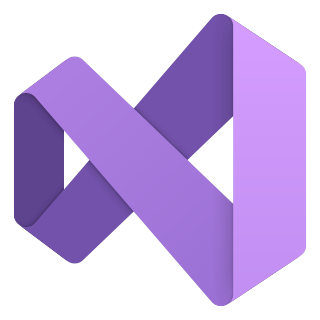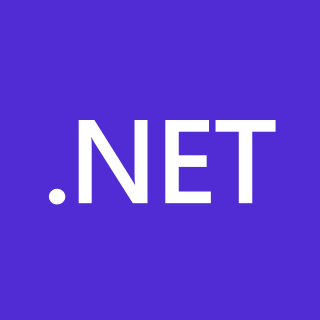
Visual Basic (VB), originally called Visual Basic .NET (VB.NET), is a multi-paradigm, object-oriented programming language, implemented on .NET, Mono, and the .NET Framework. Microsoft launched VB.NET in 2002 as the successor to its original Visual Basic language, the last version of which was Visual Basic 6.0. Although the ".NET" portion of the name was dropped in 2005, this article uses "Visual Basic [.NET]" to refer to all Visual Basic languages released since 2002, in order to distinguish between them and the classic Visual Basic. Along with C# and F#, it is one of the three main languages targeting the .NET ecosystem. Microsoft updated its VB language strategy on 6 February 2023, stating that VB is a stable language now and Microsoft will keep maintaining it.

Microsoft XNA is a freeware set of tools with a managed runtime environment that Microsoft developed to facilitate video game development. XNA is based on .NET Framework, with versions that run on Windows and Xbox 360. XNA Game Studio can help develop XNA games. The XNA toolset was announced on March 24, 2004, at the Game Developers Conference in San Jose, California. A first Community Technology Preview of XNA Build was released on March 14, 2006.
ASP.NET is a server-side web-application framework designed for web development to produce dynamic web pages. It was developed by Microsoft to allow programmers to build dynamic web sites, applications and services. The name stands for Active Server Pages Network Enabled Technologies.

SharpDevelop is a discontinued free and open source integrated development environment (IDE) for the .NET Framework, Mono, Gtk# and Glade# platforms. It supports development in C#, Visual Basic .NET, Boo, F#, IronPython and IronRuby programming languages.

C# is a general-purpose high-level programming language supporting multiple paradigms. C# encompasses static typing, strong typing, lexically scoped, imperative, declarative, functional, generic, object-oriented (class-based), and component-oriented programming disciplines.
Dotfuscator is a tool performing a combination of code obfuscation, optimization, shrinking, and hardening on .NET, Xamarin and Universal Windows Platform apps. Ordinarily, .NET executables can easily be reverse engineered by free tools, potentially exposing algorithms and intellectual property, licensing and security mechanisms. Also, code can be run through a debugger and its data inspected. Dotfuscator can make all of these things more difficult.
C# and Visual Basic .NET are the two primary languages used to program on the .NET Framework.
Sandcastle is a documentation generator from Microsoft. It automatically produces MSDN-style code documentation out of reflection information of .NET assemblies and XML documentation comments found in the source code of these assemblies. It can also be used to produce user documentation from Microsoft Assistance Markup Language (MAML) with the same look and feel as reference documentation.
The following tables list notable software packages that are nominal IDEs; standalone tools such as source-code editors and GUI builders are not included. These IDEs are listed in alphabetic order of the supported language.

MonoDevelop was an open-source integrated development environment for Linux, macOS, and Windows. Its primary focus is development of projects that use Mono and .NET Framework. MonoDevelop integrates features similar to those of NetBeans and Microsoft Visual Studio, such as automatic code completion, source control, a graphical user interface (GUI) and Web designer. MonoDevelop integrates a Gtk# GUI designer called Stetic. It supports Boo, C, C++, C#, CIL, D, F#, Java, Oxygene, Vala, JavaScript, TypeScript and Visual Basic.NET. Although there is no word from the developers that it has been discontinued, nonetheless it hasn't been updated in 4 years and is no longer installable on major operating systems, such as Ubuntu 22.04 and above. Its parent Microsoft, seems to have shifted focus to Visual Studio Code and the .NET Framework, which runs on many operating systems, including Linux.

Visual Studio is an integrated development environment (IDE) from Microsoft. It is used to develop computer programs including websites, web apps, web services and mobile apps. Visual Studio uses Microsoft software development platforms such as Windows API, Windows Forms, Windows Presentation Foundation, Windows Store and Microsoft Silverlight. It can produce both native code and managed code.
Text Template Transformation Toolkit is a free and open-source template-based text generation framework. T4 source files are usually denoted by the file extension ".tt".

The .NET Framework is a proprietary software framework developed by Microsoft that runs primarily on Microsoft Windows. It was the predominant implementation of the Common Language Infrastructure (CLI) until being superseded by the cross-platform .NET project. It includes a large class library called Framework Class Library (FCL) and provides language interoperability across several programming languages. Programs written for .NET Framework execute in a software environment named the Common Language Runtime (CLR). The CLR is an application virtual machine that provides services such as security, memory management, and exception handling. As such, computer code written using .NET Framework is called "managed code". FCL and CLR together constitute the .NET Framework.
Windows Runtime (WinRT) is a platform-agnostic component and application architecture first introduced in Windows 8 and Windows Server 2012 in 2012. It is implemented in C++ and officially supports development in C++, Rust/WinRT, Python/WinRT, JavaScript-TypeScript, and the managed code languages C# and Visual Basic .NET (VB.NET).

Mono is a free and open-source .NET Framework-compatible software framework. Originally by Ximian, it was later acquired by Novell, and is now being led by Xamarin, a subsidiary of Microsoft and the .NET Foundation. Mono can be run on many software systems.

The .NET platform is a free and open-source, managed computer software framework for Windows, Linux, and macOS operating systems. The project is mainly developed by Microsoft employees by way of the .NET Foundation and is released under an MIT License.
Universal Windows Platform (UWP) is a computing platform created by Microsoft and introduced in Windows 10. The purpose of this platform is to help develop universal apps that run on Windows 10, Windows 10 Mobile (discontinued), Windows 11, Xbox One, Xbox Series X/S, and HoloLens without the need to be rewritten for each. It supports Windows app development using C++, C#, VB.NET, and XAML. The API is implemented in C++, and supported in C++, VB.NET, C#, F# and JavaScript. Designed as an extension to the Windows Runtime (WinRT) platform introduced in Windows Server 2012 and Windows 8, UWP allows developers to create apps that will potentially run on multiple types of devices.
C++/WinRT is a C++ library for Microsoft's Windows Runtime platform, designed to provide access to modern Windows APIs. C++/WinRT is provided as a standard C++17 header file library, unlike C++/CX, which is an extension to C++ and requires a recent version of Microsoft Visual C++.







